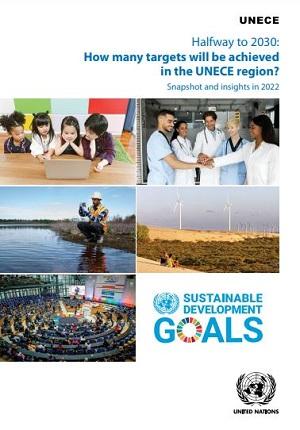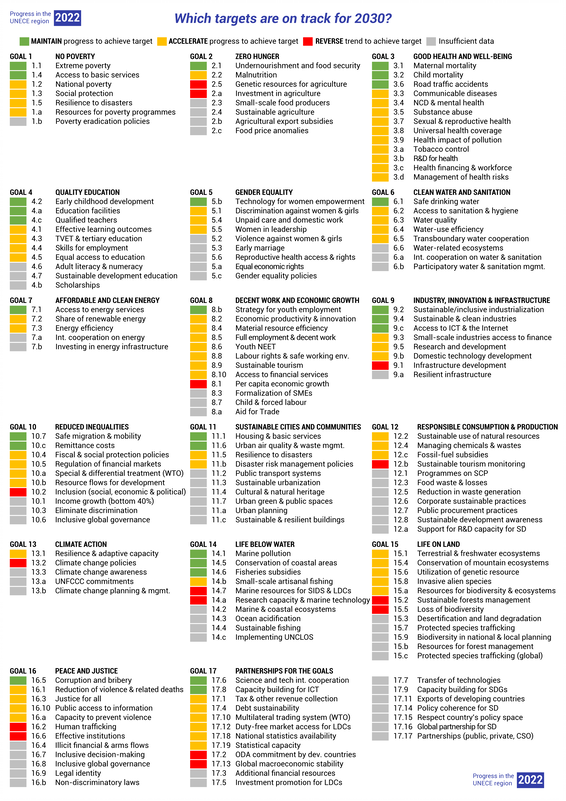
As we approach the halfway mark between the adoption and finish line of the 2030 Agenda for Sustainable Development, the region is on track to achieve only 26 of 169 SDG targets, according to the UNECE 2022 SDG progress report released today. For all other measurable targets, the region must accelerate progress or reverse current trends to achieve its 2030 ambitions. Seven years after the adoption of the SDGs, time is starting to run out to correct course. The report identifies the targets and goals where urgent action is required to make the 2030 Agenda a reality.

“Last year’s report was supposed to be a wake-up call for the region to accelerate collective action. But today, one year later, our report shows that progress has been too slow: where we needed to accelerate progress on 57 targets, this has now increased to 64; while last year we had 9 targets for which we needed to reverse the trend, we now have 15” commented UNECE Executive Secretary Olga Algayerova. “With the negative effects of the Covid-19 pandemic not yet fully reflected in available data, and the impact of the war in Ukraine still to be assessed, the risk that the region will fail on the 2030 Agenda has never been so high”, she warned.
“In addition, 40% of the 169 targets cannot be adequately measured by official statistics. This is an urgent reminder that reliable, accurate, trustworthy statistics are not only the basis of good technical analysis but are the foundation of evidence-based policymaking at all levels” she concluded.

Society
With the exception of extreme poverty that is rare in the UNECE region, targets to reduce poverty and income inequality are not on track to be achieved by 2030. One in five individuals experience multidimensional poverty across the region (target 1.2), and income inequality (target 10.2) is worsening in many countries. Regional progress on nutrition and sustainable food supply has been insufficient. Available data indicate that the region must reverse trends to maintain a diverse food supply (target 2.5) and improve agricultural productivity and efficiency (target 2.a). The region is on track to meet targets on maternal (target 3.1) and child (target 3.2) mortality and road safety (target 3.6). All other health targets require acceleration.
The region is on track to meet target 5.b on the use of technology to promote the empowerment of women, but not on the other measurable gender equality targets. Efforts must be accelerated to reduce disparities between women and men at home (target 5.4) and in the public sphere (target 5.5).
Water and energy
The region has made good progress towards access to basic services such as drinking water (target 6.1) and energy (target 7.1). To ensure the availability and sustainability of water and sanitation, the region must speed up progress on sanitation (target 6.2), water quality (target 6.3), water-use efficiency (target 6.4), and international cooperation and national management of water resources (target 6.5). Most countries have increased reliance on renewable energy (target 7.2) and improved energy efficiency (target 7.3), but acceleration is required to meet 2030 targets. Progress towards reducing fossil fuel subsidies has slowed (target 12.c), and despite a previously positive outlook, the region is no longer on track to achieve the target.
Climate and the environment
The outlook is positive for marine pollution (14.1) and conservation (target 14.5) and more regulated fishing (target 14.6). The region needs to act urgently to reverse trends around deforestation (target 15.5), biodiversity (target 15.2), sustainable tourism (target 12.b), and climate change policies (target 13.2). Greenhouse gas emissions in the region’s economies in transition continue to increase; among developed countries emissions are decreasing but not quickly enough to meet 2030 targets (target 13.2). In other critical areas such as waste generation and treatment, the sustainable use of natural resources, and the conservation of ecosystems, the region must accelerate progress.
Economy and industrialization
Most of the targets on decent work and economic growth (goal 8) are progressing too slowly to be achieved, and the impacts of the pandemic – which has affected nearly every aspect of national economies – are not yet reflected in the data available for this assessment. On the positive side, pandemic-related changes in industry and transportation may help propel the region towards sustainable and clean industrialization (targets 9.2 and 9.4). Infrastructure development (target 9.1) is regressing; additional investments are required to reverse current trends by 2030. Recent data point to worsening financial stability in the region (target 10.5), which contributes to inequality between countries.
Peace and partnerships
The Covid-19 pandemic has demonstrated the importance of international cooperation around science and technology, and progress in the region is strong in this area (target 17.6). The immediate impacts of the pandemic are reflected in data on government expenditure (16.6), global economic stability (target 17.3), and development assistance to developing countries (target 17.2), which point to worrying regressions. It may be difficult for the region to reverse these trends as countries deal with the lasting impacts of the pandemic.
Persistent data gaps
The report also highlights persisting data gaps that impede progress. While the scope of available data has improved in recent years, the way forward remains unclear on many targets due to a lack of data. Forty per cent of targets cannot be measured for the region due to insufficient data or other measurement challenges. Most unmeasured targets do not have data for sufficient countries or years for an accurate regional-level assessment. In all, data to track trends over time for the region are available for 142 (57 per cent) of the 247 global monitoring indicators and for 105 (62 per cent) of the 169 targets.
Stories provided by the agencies (IOM, ITU, Partnership in Statistics for Development in the 21st Century, UNCTAD, UNESCO, UNICEF, UN Women & EFTA) and United Nations country teams (UN Bosnia and Herzegovina, UN Moldova) participating in the Regional Coordination Group on Data and Statistics for Europe and Central Asia help to bridge knowledge gaps. These stories take a closer look at how various regional and country level actions relate to sustainable development outcomes. The contribution from UN Women brings spotlight to gender equality and women’s empowerment (SDG 5).
The report is a tangible outcome of the successful cooperation in the Regional Coordination Group on Data and Statistics for Europe and Central Asia. This type of regional collaboration reflects the spirit of Our Common Agenda—the United Nations Secretary-General’s vision to reinvigorate multilateralism and accelerate the implementation of the Sustainable Development Goals.
Note to editors
The analysis, which compares estimated indicator values for 2030 with indicator target values, shows that for 64 targets the overall the pace of progress is too slow to meet the 2030 mark. The region is moving in the wrong direction on 15 targets. This year’s analysis employs the same methodology used in last year’s report and in assessments across the five United Nations regional commissions, allowing for comparisons of progress over time and across regions.